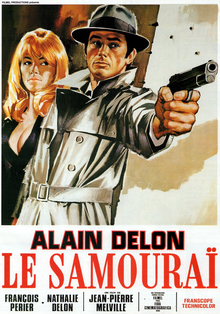Blast from the Past
Jean-Pierre Melville directed The Samurai, his masterful neo-noir crime thriller, starring Alain Delon in one of his best and most iconic roles.
The film also features François Périer, Nathalie Delon, and Cathy Rosier.
Grade: A (***** out of *****)
| Le Samouraï | |
|---|---|

Theatrical release poster
|
|
Both text and subtext are crucial in this intricate tale about the paths of a professional hitman (Delon), who’s trying to find out who hired him for a job and then tried to have him killed.
Melville’s should be praised for his spare screenwriting, atmospheric direction, superlative mise-en-scene, and coaxing one of Delon’s quietest and multi-nuanced performances.
An English-dubbed version of the film was released in 1972 as “The Godson” (bad choice).
Jef Costello, an Impassive hitman, lives modestly in a single-room Paris apartment, with his companion, a bird in a cage,
His modus operandi involves creating airtight alibis, some assisted by his lover, Jane.
After carrying out a contract killing on Martey, a nightclub owner, Jef is seen leaving the scene by the club’s piano player, Valérie, and glimpsed by other witnesses. The police bring Jef and other suspects in for a lineup, but the witnesses, including Valerie, fail to identify him.
Though released, the commissaire remains successful and follows him. While trying to collect his fee for the hit, the man he meets tries to kill him, shooting him in the arm.
Jef realizes that his unknown employers now view him as liability because he is suspected in Martey’s murder. While he is out, two police officers bug his room, agitating the bird in its cage.
After the nightclub closes, Valérie says that she did not identify him as the killer because his employer had told her not to. He asks her who hired him, and she tells him to call her in two hours. Meanwhile, the police search Jane’s apartment and offer to leave her alone if she recants her alibi for Jef, which she rejects.
Back at his apartment, Jef finds the police bug and deactivates it, and then goes out to call Valérie, who does not answer. When he returns home, he is ambushed by the man who shot him. Holding Jef at gunpoint, the man offers a fresh start. He pays Jef for the hit as well as for an upcoming one. Jef then forces him to disclose the identity of his boss: Olivier Rey.
Undercover police attempt to tail Jef in the Paris Métro, but he evades them. He drives to Rey’s house, which is also where Valérie. Jef kills Rey and returns to the nightclub. He leaves his hat-check ticket on the counter, and puts on white gloves, which he wears when carrying out his hits. Valérie advises him to leave, but he points his gun at her.
Suddenly, Jef is shot by policemen who had been waiting for him. Ironically, when the Commissaire inspects Jef’s gun, he discovers it was not loaded.
Melville wrote the film for Delon, which served as the first one for Delon’s wife Nathalie; they divorced in 1969.
Melville’s private studio was destroyed by a fire on June 29, 1967, while Le Samouraï was in production, forcing him to finish the shoot at another studio.
Melville originally filmed Jef Costello meeting his death with a picture-perfect grin, but he modified the scene after discovering Delon had a smiling death scene in another film.
In 2010, Le Samurai was ranked No. 39 on Empire’s list of “The 100 Best Films of World Cinema.”
Cast
Alain Delon as Jef Costello
François Périer as the Commissaire
Nathalie Delon as Jane Lagrange, Jef and Wiener’s girlfriend
Cathy Rosier as Valérie, the pianist at Martey’s
Jacques Leroy as “The Man on the Bridge”, a hitman working for Rey
Michel Boisrond as Wiener, Jane’s wealthy boyfriend
Robert Favart as the bartender at Martey’s, who is a witness at the lineup
Jean-Pierre Posier as Olivier Rey, who has Martey killed
Catherine Jourdan as the hatcheck girl, a witness at the lineup
Directed by Jean-Pierre Melville
Screenplay by Melville, Georges Pellegrin
Produced by Raymond Borderie, Eugène Lépicier
Cinematography Henri Decaë
Edited by Monique Bonnot, Yolande Maurette
Music by François de Roubaix
Release date: October 25, 1967
Running time: 105 minutes
Box office: 1.9 million admissions (France); $218,495 (US re-release)










